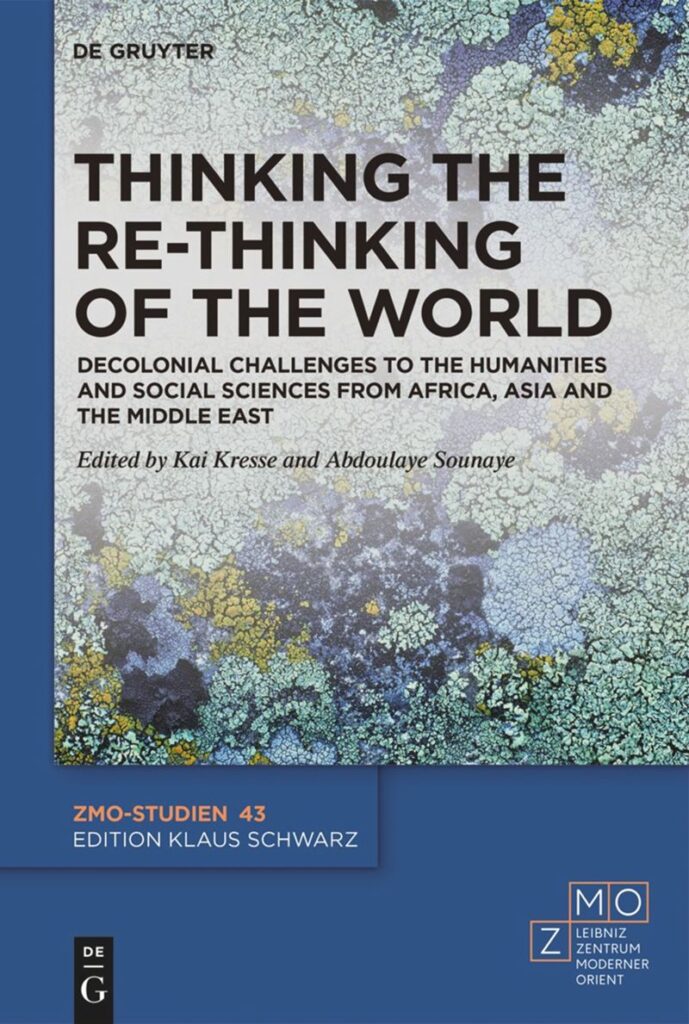Decentering Enlightenment: New Publication by Roman Seidel
von:
Roman Seidel article “Decentring the Grand Narrative of the Enlightenment: The Transregional Micronarrative of Mīrzā Āqā Khān Kermānī’s Writings in Global Intellectual History,” has just been published in the Volume Thinking the Re-Thinking of the World. Decolonial Challenges to the Humanities and Social Sciences from Africa, Asia and the Middle East, edited by Kai Kresse and Abdoulaye Sounaye. The Book appeared as Volume 43 of the ZMO-Studien. Edition Klaus Schwarz with DeGruyter. Seidel’s article discusses some methodological reflections such as epistemic asymmetries and the idea of philosophical micro narratives and sketches such a narrative for a re-reading of Kermānī’s thought in the context of both Iranian Intellectual History and the History of Enlightnement in a transregional and global frame. This study emerged out of his research project TransIranIdea (funded by the German Ministry of Education and Research).
Excerpts for the Editors Introduction:
Roman Seidel’s chapter, has been commented on above already. This important, refreshing, and detailed narrative of the biographical trajectories and intellectual entanglements of a nineteenth century Iranian scholar who had dedicated himself to European Enlightenment philosophy provides us with an important example, especially when pursuing a decolonising agenda. Seidel shows us how it is worthwhile to explore, with attention to detail, the attraction that some European Enlightenment thinkers and texts may have had for thinkers and societies in very different contexts. Some of them were eagerly read and engaged with and appropriated and disseminated further in altered forms and ways that differed from the original author’s intentions. On the whole, Seidel’s chapter proposes “a decentred take on both the history and the idea of the Enlightenment, which may open up pathways to re-think the history of Enlightenment.” (p. 156) This, he also sees as a means to build “a decolonial perspective towards multiple entanglements in intellectual history.” (p. 156) In other words, working with micronarratives of this kind, which offer an insight into specific kinds of entanglements, offers us a perspective to build and contribute to decolonial thinking. Indeed, Seidel’s is a novel way to examine the Enlightenment as an intellectual moment and style. Taking seriously the diversity of intellectual traditions, genres and practices, his contribution calls for openness to the actual historical entanglements, differences and nuances of the world, and also to questions about how to organise accounts adequately, in epistemological, social and cultural terms. With a view to Kermani himself, Seidel asks another intriguing question, which we would like to flag in conclusion: “As a thinker in his own right, is it adequate to label Kermānī an Iranian, Middle Eastern, transregional or global protagonist of the Enlightenment?” ( p. 183); is he all of these, or none?-
Seidel provides us with a fascinating account of an Iranian intellectual, Mīrzā Āqā Khān Kermānī, a late nineteenth century scholar whose thinking was significantly shaped by (in addition to schools of Islamic philosophy) engaging with Enlightenment philosophy. Seidel, himself trained in Farsi and in Islamic Studies as much as in Western philosophy, portrays the thought and biographical trajectory of this scholar in a micronarrative of global intellectual history that seeks to do justice to complex overlapping strands of different intellectual worlds and traditions. These are present in, and pushed by, a non-Western mediatory figure of Western Enlightenment thought. What, in the end, can such narratives teach us? In Seidel’s words, a web of similar transregional micronarratives “provides a means for a decentred intellectual history in which south-south intellectual relations become equally important and must not necessarily take the detour via the Centre (Europe/the North).” (p. 184) As such, he argues, “They may provide a decolonial means for questioning the alleged centricity of the ‘Centre.’” (p. 184) Such arguments for an active and critical engagement with relevant aspects, interpretations, and mediations of European Enlightenment as used elsewhere should be taken on board and engaged with further.
On the entire volume Thinking the Re-thinking of the World:
As far too many intellectual histories and theoretical contributions from the ‘global South’ remain under-explored, this volume works towards redressing such imbalance. Experienced authors, from the regions concerned, along different disciplinary lines, and with a focus on different historical timeframes, sketch out their perspectives of envisaged transformations. This includes specific case studies and reflexive accounts from African, South Asian, and Middle Eastern contexts. Taking a critical stance on the ongoing dominance of Eurocentrism in academia, the authors present their contributions in relation to current decolonial challenges.
Hereby, they consider intellectual, practical and structural aspects and dimensions, to mark and build their respective positions. From their particular vantage points of (trans)disciplinary and transregional engagement, they sketch out potential pathways for addressing the unfinished business of conceptual decolonization. The specific individual positionalities of the contributors, which are shaped by location and regional perspective as much as in disciplinary, biographical, linguistic, religious, and other terms, are hereby kept in view. Drawing on their significant experiences and insights gained in both the global north and global south, the contributors offer original and innovative models of engagement and theorizing frames that seek to restore and critically engage with intellectual practices from particular regions and transregional contexts in Africa, South Asia, and the Middle East.
The book was published by de Gruyter in December 2022 and is available in Open Access: https://www.degruyter.com/document/doi/10.1515/9783110733198/html
- Link to the chapter Decentering the Grand Narrative of the Enlightnement (Roman Seidel)
- Link to the entire open access volume Thinking the Re-thinking of the World (Kai Kresse / Abdoulaye Sounaye)
- Link for further information and registertation for the public online book launch on 13th March 5pm-6.30pm CET

